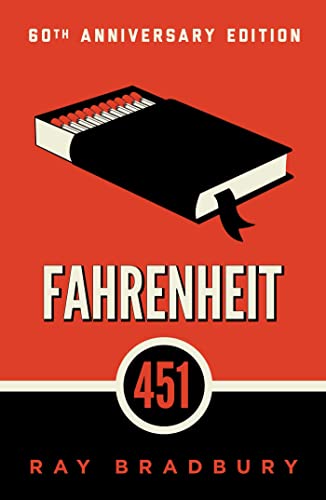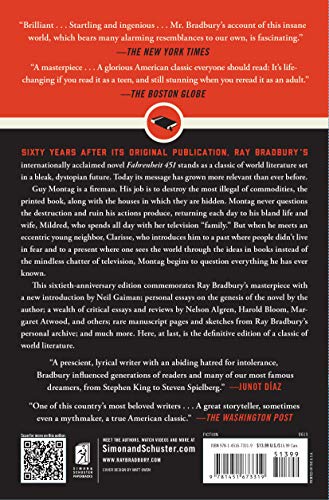Hey, fellow bookworms! Today, we’re tackling a fiery classic called Fahrenheit 451. This review will sizzle through the pages to reveal themes like censorship, technology, and good ol’ individualism. So, grab a snack and buckle up! But don’t worry, I’ll keep it fun and honest, highlighting both the good and the not-so-hot parts of the story. Let’s burn through this review together!
Fahrenheit 451: A Scorching Tale
In a nutshell
Ray Bradbury’s Fahrenheit 451 is a classic dystopian novel. It explores a future American society where books are banned and ‘firemen’ burn any that are found. The story follows a fireman named Guy Montag. The book raises thought-provoking questions about censorship, the role of technology, and the importance of independent thought. Bradbury’s work is a staple in the science fiction genre, offering readers a thrilling yet cautionary tale.
Censorship and Its Flaming Consequences
Censorship has been a hot potato for as long as I remember. It’s like that time I tried to hide my brother’s report card, only on a massive scale and with much worse consequences! One of the best books that tackles this issue head-on is Ray Bradbury’s Fahrenheit 451. Set in a future where books are banned, it paints a world where firemen ignite fires instead of putting them out. Seriously, the only thing worse than burning toast is burning books!
Bradbury shows what happens when society stifles ideas. People become disconnected, almost robotic, losing their ability to think critically. The protagonist, Montag, experiences this firsthand. Initially, Montag seems okay with the status quo, but he eventually realizes that knowledge is power. It reminded me of the time I thought I could write my book report without actually reading the book. Believe me, it didn’t go well!
Despite its fictional setting, the message remains relevant. When censorship prevails, society loses its soul. While controlling information may provide the illusion of safety, it strips away diversity of thought and creativity. Just like how I miss out on great jokes when I try to follow a script!
But, be warned, the story isn’t without flaws. Some parts feel rushed and leave you hungry for more details. Yet, Bradbury manages to light a fire in our minds, encouraging us to question the world around us.
Next up, get ready for a whirlwind of pixels and bytes with The Role of Technology!
The Role of Technology in Fahrenheit 451
Technology, boy oh boy, it’s a wild ride. In Ray Bradbury’s Fahrenheit 451, technology plays a huge part in shaping society, kind of like that time my GPS took me to a pizzeria when I wanted a gym. People in the book are glued to their screens, much like how my dog fixates on the TV when there’s dog food ads playing. They don’t just have TVs; they have gigantic, wall-sized screens that surround them. It makes my phone seem like a pocket calculator from the Stone Age.
In Bradbury’s world, folks get their dose of ‘entertainment’ from these interactive screens called parlors. Imagine a chat show where people yammer at you from all sides, and you can’t stop it, like those relatives you pretend to like at family gatherings. Consequently, there’s a major disconnect from reality. People lose touch with the real world, their neighbors, and even their own thoughts. It’s a bit like me forgetting what day it is after binge-watching a TV series over the weekend.
Technology in Fahrenheit 451 is also used for surveillance, keeping people in line like an overzealous hall monitor. Mechanical hounds sniff out potential troublemakers, reminding me of the time my aunt’s dog kept barking at me for wearing a silly hat. Technology becomes a tool for control, not connection, which makes for a dystopian cocktail. Up next, let’s explore how the book tackles the concept of individualism in society; spoiler alert – it’s more than just wearing mismatched socks.
Individualism: A Beacon in the Conformist World of Fahrenheit 451
Individualism in society can be a saving grace or a risky venture, depending on who you ask. Growing up, I remember a time when I did something… let’s just say ‘unique’ at school, and got a month’s worth of detention as my reward. Lesson learned, right? Well, that brings us to the battle of individualism in Ray Bradbury’s Fahrenheit 451. Here, Bradbury paints a vivid picture of a dystopian world where books—symbols of individual thought—are banned, and conformity is the name of the game.
The protagonist, Montag, is a shining example of what happens when individualism starts peeking its head out from behind the suffocating curtain of enforced sameness. He questions the norm and begins to seek knowledge, showcasing that unique spark of human nature that strives for personal growth and understanding against all odds. The story emphasizes how individualism can be a powerful catalyst for change in a society that seeks to suppress it.
However, Bradbury doesn’t ignore the downsides. Being different in a world that values uniformity can be downright dangerous. Just like me trying to explain my version of art to a room full of confused classmates, Montag faces challenges that test his resolve. The book serves as a thought-provoking message that individualism, though potentially risky, is vital for societal evolution.
In the next section, we will explore the unusual role of firefighters in Fahrenheit 451 as they wield their hoses of igniting irony. Join me as we fan the flames of this fiery symbol!
The Symbolism of Firefighters in Fahrenheit 451
When you think of firefighters, you might picture them heroically saving cats from trees or valiantly battling blazes. However, in Ray Bradbury’s Fahrenheit 451, firefighters represent something quite different. These guys don’t extinguish fires—they start them! Crazy twist, right?
In this world, firefighters torch books to suppress knowledge and maintain social order. Their role symbolizes the destructive power of censorship. Instead of protecting the public, they silence it. It’s like if your dentist decided to eat candy all day and then told you to floss. Doesn’t make sense!
The whole burning-books thing initially seems pretty twisted and backwards. However, it shows how twisted society can become when people stop questioning authority and let ignorance take the reins. Captain Beatty, the fire chief, even tells Montag that fire is the ultimate cleanser. I mean, talk about some next-level justifying! Imagine using the same logic to explain why you wear socks with sandals. Yikes.
Despite their sinister role, firefighters in Fahrenheit 451 serve as a wake-up call. They remind us of the importance of challenging oppressive norms and valuing individual thought. Kind of like when you hear your favorite tune from the ’90s, and it makes you re-evaluate today’s music scene. Nostalgia and reflection can be powerful.
In summary, if you don’t mind your brain getting grilled by thought-provoking themes, I totally recommend picking up Fahrenheit 451. Just keep a fire extinguisher handy for any existential crises!
Conclusion
Alright folks, that’s a wrap on this review! Fahrenheit 451 packs a punch with its themes of censorship, technology, and individualism. Ray Bradbury’s world will make you think twice about book-burning firemen and technology’s role in society. Grab a copy if you love a thought-provoking read. Remember, even the best books have their flaws, but this one is worth a spot on your shelf. Happy reading!



